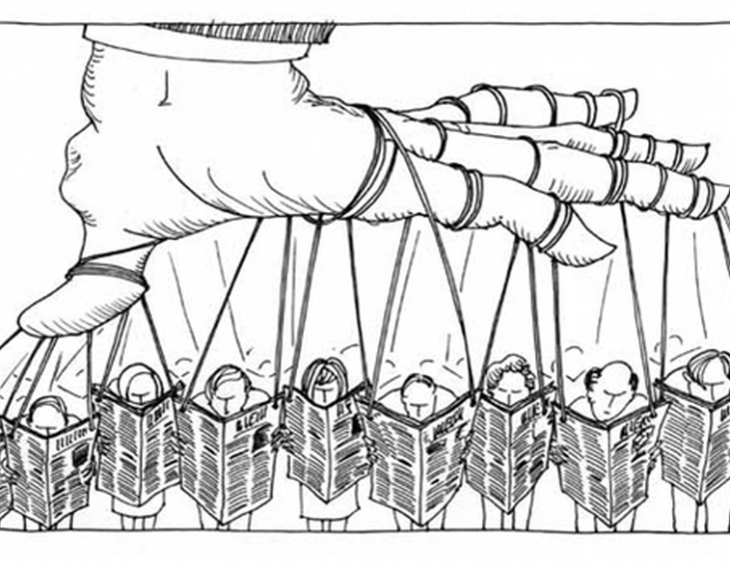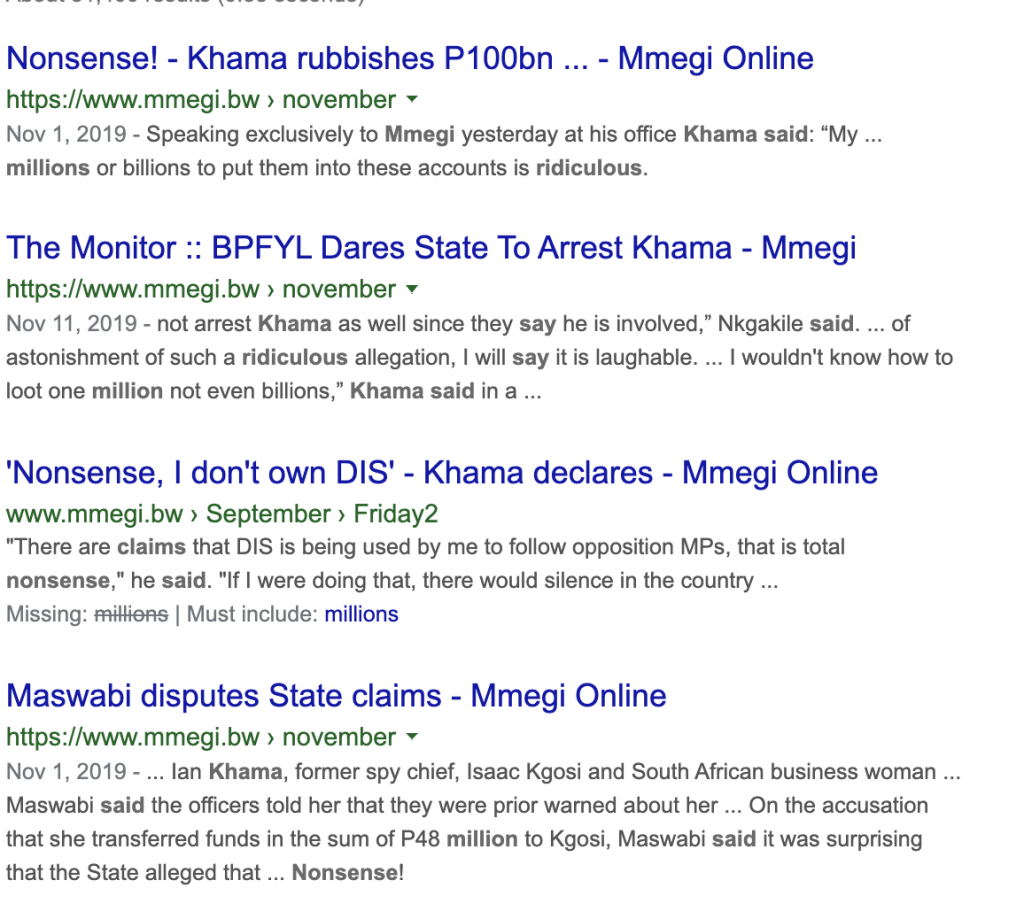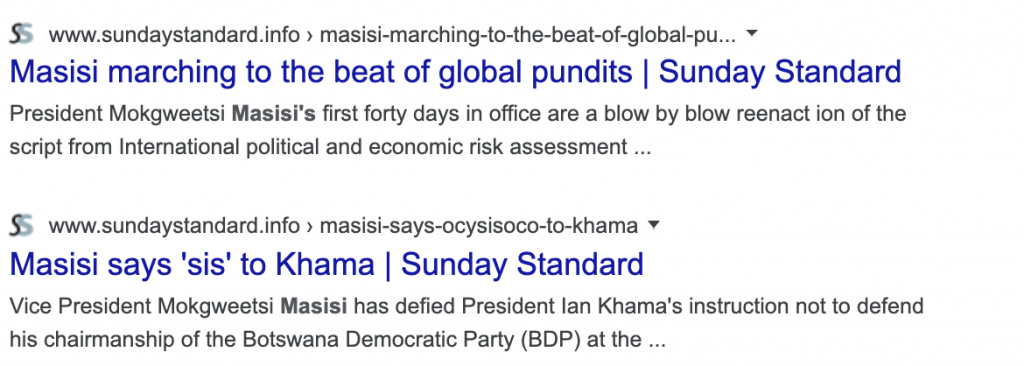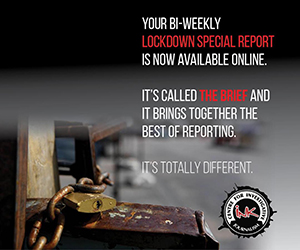
Journalism needs to rethink ethics
21 January 2020The general election provided a litmus test of Botswana’s media, showing that is not independent of financial and political influence. JOEL KONOPO* analyses the country’ ailing media sector.
We live in a divided political environment and amid radical economic disparities. But there is one thing on which virtually everyone in Botswana agrees: most of the news and information we are fed is biased.
There are constant complaints about bias, in everything from the latest court cases in which the main parliamentary opposition is challenging the outcome of the October election, to the coverage of a court case involving an intelligence operative accused of siphoning hundreds of millions of dollars into foreign accounts.
I am not advocating a belligerent relationship with the government – but I am disturbed that the narrative offered by our journalism appears to be directly influenced by politicians. The hobnobbing with them leaves the media too weak to hold them to account.
When I became a journalist, I was animated by the adversarial journalistic ethos that I saw among some veteran journalists.
Their unwavering commitment to holding power to account, without hoping for an increase in Facebook followers, made a deep impression. This commitment is, sadly, disappearing.
However, the New Year presents an opportunity to kick off a conversation about the future of quality public-service journalism and how we can restore the public trust that has been eroded.
We live in a world in which journalism and freedom of information run up against an invisible wall consisting of money and conflicting interests.
Do we have the tools to guard against political and commercial interests bent on exploiting the fourth estate?
The problem arises when networks of influence and money determine how information is turned into news and how power is distributed. On this front, Botswana’s media, especially print media, is looking worse with every year that passes.
Should our media take sides in politics? To what extent?
In mature democracies public opinion is increasingly divided along partisan lines, according to a recent report by Pew Research Centre, citing the case of United States.
Curated news gives rise to filter bubbles that strengthen political beliefs, further entrenching people’s political views. But Western democracies are endowed with checks and balances that, at least to some extent, hold power to account.

Do we have a partisan media?
At home, gloom centres on the mainstream commercial media. Ours is a Chomskyite “propaganda model” which resonates with political elites: the government hands out advertising while sending out signals about what it wants covered.
This unfolded in October when some sections of “friendly” private media were fed sanctioned leaks by the Directorate on Intelligence and Security Services (DIS) that were immediately treated as a matter under official investigation, without the slightest attempt to verify them.
Using the leaks, for example, the Sunday Standard newspaper claimed that South African billionaire businessman Patrice Motsepe and his sister, Bridgette Motsepe-Radebe had smuggled R22-million (around P20 million) into Botswana and donated it to veteran politician Pelonomi Venson-Moitoi’s campaign, to influence succession politics ahead of the ruling party’s elective conference in July.
Months later, the Botswana High Court interdicted and restrained the paper from publishing “false and/or defamatory allegations” about Motsepe.
In the run-up to the election, one media faction lined up to cheer President Mokgweetsi Masisi and presented him as a victim of smear campaign by the opposition, particularly former president Ian Khama, who had left the ruling party to form his own political grouping.
Others took pleasure in defending the Umbrella for Democratic Change leader, Duma Boko, without investigating his suspiciously large campaign resources.
The implication is that one side – or perhaps both – was feeding lies to a naïve and over-emotional public.
Journalists and broadcasters who try to remain neutral are constant objects of scrutiny and derision by certain media managers.
One example was the ridiculous smear by Mmegi’s managing editor, Titus Mbuya, in 2016 that journalists at INK Centre for Investigative Journalism were “snouts in the CIA feeding trough.”
Mbuya’s attack followed an INK report that Dikgang Publishing company had partnered with Sayeed Jamal, a local property mogul, with links to the ruling Botswana Democratic Party. Dikgang is the publisher of two major newspapers; Mmegi and Botswana Guardian.
Having an ideological stance should not be taboo for the media – as long as it is declared. It becomes a problem when the media fails to acknowledge bias and a political agenda.
Fox News for example does not pretend to be a liberal media organization under the guise of journalistic objectivity. On the other hand, Steve King, a Republican congressman from Iowa would not expect positive reviews from The New York Times.
There was a time when it seemed acceptable for Botswana’s private media to slant its coverage to reflect the views of the opposition parties, even if the rulebook outlawed bias.
It was a mindset that began with the legitimate need to counter the state media’s flagrant bias and prescriptive coverage of government policies and the ruling Botswana Democratic Party.
However, this was systematically weakened by the corrosive cynicism of the “Khama-ites” who routinely denounced the mainstream media as “unpatriotic, shallow and offering nothing new”.
Those journalists and publications that tried to maintain their critical distance from power paid dearly when Khama introduced a surreptitious ban on government advertising in most newspapers in 2014, which undermined their financial health and led to job losses. As a result, Mmegi lost almost 25 percent of its staff around 2013 and 2016.
A 2019 study by Transparency International ranks most African media and politicians as corrupt and incompetent. Botswana was not included, but could well have been.
Its media has singularly failed to hold the country’s politicians to account. The 2019 general election gave testimony that local journalists can no longer be “trusted observers”, as they are deeply entrenched in politics and deny voters the right to make informed choices because their information is unreliable.

We entangled ourselves in politics
Another feature of the election campaign was that of social media influencers known previously to have been journalists who are able to weaponize their “journalistic access” and use the tools of journalism to whip up support for both Boko and Masisi. With over 18 000 followers on Twitter and massive Facebook friends, Sonny Serite political posts and tweets were pivotal in the discourse in the just ended election and hugely favoured Masisi and the Botswana Democratic Party. Daniel Kenosi, a former journalist, now a Facebook influencer with around 218 000 friends was a known Boko sympathizer.
Yes, some sources want to use the media, but if journalists are aware of this and interrogate their sources, this does not have to be a problem. Our biggest challenge is that most newsrooms do not have clearly defined processes for verifying data and investigating allegations that cannot be bypassed.
This behaviour lends credence to critics who say we are not to be trusted.
Sadly, the collapse of journalistic standards is a worldwide trend, sometimes aided and abetted by governments.
In Zimbabwe, the media took pleasure in the factional battles in Zanu-PF between the G40 faction of the former first lady, Grace Mugabe, and the Team Lacoste faction of her nemesis, then vice-president Emmerson Mnangagwa.
Before the toppling of President Robert Mugabe, the two biggest independently owned papers, The Daily News and Newsday, were leaked stories and documents by Zanu PF politicians in a move to expose and attack a rival camp. In the mad rush for leaks, the core principles of ethical reporting were sacrificed.
At home, the BDP split that pitted former president Ian Khama against his hand-picked successor, Masisi, pushed Botswana further down the ethics cliff.
Journalists who lacked the professional tools to independently interpret the political dynamics in the BDP became entangled in the party’s factional wars.
They abandoned their mandate and forgot that politicians have a narrow electoral agenda that is quite different from the independent truth-telling that media practitioners should stand for.
For most media houses, either Boko and Khama became the enemy against whom public opinion needed to be mobilised.
An example was the privately owned Sunday Standard, which outdid the state-owned Daily News in praising and defending Masisi and his government.
Just after the election, the media was divided in its coverage of startling allegations that while in office Khama shifted millions of dollars to offshore accounts with the help of the central bank. The Standard again led the onslaught in vilifying Khama – without providing any independent evidence.
Perhaps influenced by competitive rivalry, the normally staid Mmegi leapt to Khama’s defence. “Nonsense!” shouted its November 1 2019 front page. It gave copious editorial space to Khama’s denial of the money-laundering allegations, putting itself squarely in the opposition camp.
At the same time, the Sunday Standard spent little time investigating allegations that Masisi might have benefited from the National Petroleum Fund, leaving the job to more neutral publications such as Business Weekly & Review, Botswana Guardian and Botswana Gazette and concerning itself mostly with investigating – again without providing any evidence – the alleged relationship between Boko and Lebanese businessman Zunaid Moti.
Newspaper circulation has fallen by half in Botswana over the past decade. This is partly because the social media has in many respects replaced the “legacy media” as the leading source of information, to use Francis Fukuyama’s distinction.
The internet has enormously greater power to amplify certain voices and to be weaponised by politicians. Once doubt descends on public life, people tend to find their own truths.
But Botswana’s “independent” media have also lost readership and listenership because it struggles to remain aware of the changing times and demands of its audience, and has lowered standards of accountability.
The private media will always have some degree of vulnerability to those who control the purse strings. But in Botswana, lack of advertising has rendered most private media houses highly vulnerable and created a pervasive culture of self-censorship.
In 2013, Mmegi apologised to Choppies after its investigative journalist, Lawrence Seretse wrote a well-researched investigation into the supermarket chain’s mislabeling of expired and damaged food.
Two years later, Mbuya published an Op-Ed in Mmegi defending head of intelligence, Isaac Kgosi after it was revealed that Choppies had transferred shares allegedly worth P4 million to Kgosi before it listed in Botswana. At the time, the country’s intelligence was investigating allegations that Choppies had repackaged Red Cross food destined for Malawi. Mbuya said Kgosi has the right to shareholding in any company.
Perhaps not surprising, in 2016, the newspaper refused to run a story about Choppies after one of its reporters did a follow-up on how the company continued to sell expired, damaged and weevil-infested food.
Print journalists could reduce their vulnerability to advertising bans and censorship from above by the simple expedient of toeing the line. But because of the loss of editorial integrity, they are bleeding trust.
The industry’s lack of an effective self-governing mechanism – like South Africa’s Press Council – enables journalists to get away with professional misbehaviour, and this unsustainable path has taken its toll on reader confidence.
Like the government, the media has taken a wrecking ball to its oversight institutions by weakening them in exchange for selfish gain. A free media is self-governed. That is a huge responsibility, and currently our self-governing oversight mechanism has no capacity to effect change.
This is partly because those who run the media watchdog bodies are themselves publishers. They have maintained a tight grip on key positions, which renders them brokers in the eyes of politicians. Both the Press Council of Botswana and the Editors Forum exist only in name and the journalism union has not had elections in years allowing current heads to remain in positions, sometimes for over four years. Media Institute of Southern Africa, of which I am a board member has not had election in more than 12 months.
Yes, the media’s relations with the government are warmer under president Masisi than they were under Khama
But some of them have lost all critical detachment. They should remember that Masisi was wholeheartedly in favour of the government regulation of the media and the Media Practitioners Act when he was Khama’s vice-president.
The Act compels all journalists to register and be accredited with a statutory media council. It drew the criticism of lawyers and human rights activists, and is currently in abeyance pending the endorsement of the Law Society of Botswana.
Masisi only warmed to the media after becoming president. He has paid lip service by pledging to repeal the Act – but has failed to do so despite being nearly three years in office.
Instead of urging Masisi and Botswana Democratic Party politicians to repeal the offending legislation, many reporters wine and dine with, and seek to get close to, those in power. They are afraid of losing access to the next sanctioned DIS leak, or the opportunity to rub shoulders with the “big men” and take selfies with them.
In 2020 we must restore the integrity of our profession. We must develop the patience to verify and fact-check information, and particularly leaked official information, before we publish.
Scepticism is healthy – the public should be deeply suspicious of the official version and news reports based on single information sources.
We must abandon the desire to be fed sanctioned leaks and official accounts from intelligence sources and putting them straight into print without interrogating them. That is not journalism.
*Konopo started journalism at Mmegi and later became editor of Botswana Guardian. He is a board member of the Media Institute of Southern Africa. He is co-founder of INK Centre for Investigative Journalism, a non- profit news outlet that promotes independent reporting.


Join the Conversation